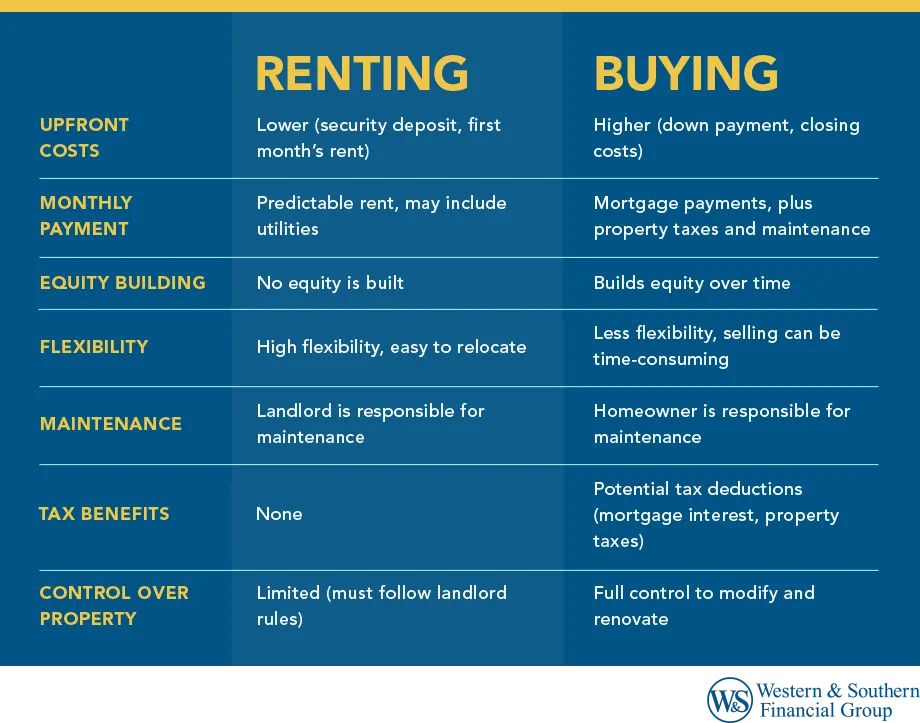

Key Takeaways
- Renting offers mobility while buying helps provide long-term stability.
- Renting requires lower initial costs, whereas buying involves a down payment and closing fees.
- Homeownership builds equity, but renting doesn’t contribute to ownership.
- Renters avoid maintenance costs, while homeowners are responsible for repairs.
- Rent may increase, but mortgage payments can be fixed, helping provide stability.
When it comes to deciding between renting or owning a home, the answer is rarely simple.
Both renting and owning offer unique advantages and potential downsides that can impact your financial wellness.
Depending on your personal goals, current lifestyle, and financial health, one option may prove to be significantly better than the other.
This article will explore the ins and outs of renting and owning, offering a comprehensive guide to help you determine which choice is right for your financial future.
Understanding Renting
Renting is often viewed as a flexible option that caters to individuals who prefer mobility, fewer responsibilities, or who aren't ready for the financial commitment of owning a property. Here are some of the key advantages and disadvantages of renting:
Pros: Benefits of Renting
- Flexibility and Mobility: Renting provides an unmatched level of flexibility. With a lease that typically lasts 6-12 months, renters can quickly relocate without the stress of selling a home. This makes renting an ideal choice for individuals uncertain about their long-term plans or who expect to move frequently due to work or personal reasons.
- Lower Upfront Costs: Renting typically requires significantly lower upfront costs compared to buying a home. While you may need to provide a security deposit and the first month’s rent, these rental costs are generally much lower than a down payment on a home and closing costs.
- Maintenance-Free Living: One of the most significant advantages of renting is that maintenance and repairs are generally the landlord’s responsibility. As a renter, you won’t need to worry about unexpected repair bills, whether a leaky faucet or a broken air conditioning unit.
Cons: Drawbacks of Renting
- No Equity Building: One of the most significant drawbacks of renting is that your monthly payments do not contribute to building any equity. Unlike homeowners who gradually build wealth through property ownership, renters may feel like they are throwing money away with every rent check.
- Rent Increases: Rent prices are often subject to annual increases, especially in high-demand areas. Renters may face rising costs without the certainty of fixed payments that mortgage holders can enjoy.
- Limited Control Over Property: Renting means you have limited control over the property. From restrictions on decorating and renovations to dealing with the possibility of your lease not being renewed, renters have less say over their living environment compared to homeowners.
Understanding Buying
Homeownership is often considered a milestone achievement and a core component of the "American Dream." However, owning a home comes with its own set of advantages and challenges. Let’s take a closer look:
Pros: Benefits of Buying
- Building Equity and Wealth: When you own a home, your mortgage payments contribute to building equity. Over time, as you pay down the mortgage and property values potentially increase, owning a home can become a powerful opportunity for building equity tool.
- Stability: Homeownership helps provide a sense of stability and security. Unlike renting, where you might need to move if your lease isn’t renewed, owning a home gives you control over how long you stay and how you want to manage the property.
- Tax Benefits: Many homeowners can benefit from tax deductions, including mortgage interest and property taxes. These deductions can significantly reduce the overall cost of homeownership, making it more affordable in the long term.
- Creative Freedom: As a homeowner, you fully control your property and can make improvements, renovations, and modifications to your space. From painting walls to building additions, you can customize it to fit your needs and preferences.
Cons: Drawbacks of Buying
- Payment Upfront: Purchasing a home involves considerable upfront costs, including a mortgage down payment, closing costs, and moving expenses. These costs can add up quickly, making homeownership unattainable for some individuals without significant savings.
- Maintenance and Repairs: As a homeowner, you are responsible for all maintenance and repair costs. These expenses can be unpredictable, and significant repairs, such as roof replacement or plumbing issues, can be costly.
- Less Flexibility: Compared to renting, homeownership offers less flexibility. If your job requires you to relocate, selling a home can be lengthy and expensive, particularly if the housing market is slow.
Financial Comparisons: Renting vs. Buying
The financial implications of renting versus buying are key factors in this major decision. Both options have distinct financial advantages and disadvantages that can influence your opportunities for building equity potential.
Upfront Costs
- Renting: When renting, upfront costs are relatively low. You may need to pay a security deposit, rent for the first month, renters insurance policy, and perhaps some application fees.
- Buying: In contrast, buying a home requires a substantial down payment, typically between 3% and 20% of the home’s purchase price. Additionally, buyers must cover closing costs, which can range from 1% to 5% of the loan amount. Your mortgage lender may also require private mortgage insurance.
Monthly Housing Costs
- Renting: Monthly rent payments tend to be predictable and often include utilities or other amenities. However, renters have no guarantee that their rent won’t increase over time.
- Buying: Monthly mortgage payments can be fixed if you opt for a fixed-rate mortgage, helping provide stability in your monthly expenses. In addition to the mortgage, you must pay property taxes, homeowners insurance, and maintenance costs.
Opportunity Costs
Opportunity cost is an important factor to consider when evaluating renting versus buying. Money spent on a down payment or closing costs could be used as a financial investment elsewhere, such as in stocks or retirement accounts, potentially yielding a higher return. On the other hand, owning a home can provide a form of "forced savings" as you pay down your mortgage and build equity.
Lifestyle and Personal Goals
When deciding between renting and owning, it’s essential to consider your personal goals and lifestyle choice. Renting may be the best choice if you value flexibility, have an unpredictable career path, or are not ready to commit to a specific area. It’s also an attractive option for those who prefer to avoid property maintenance responsibilities.
On the other hand, if you’re looking for stability, have a long-term plan for staying in a particular area, or wish to invest in an appreciating asset, buying a home could be the right path for you. Homeownership can be especially rewarding for financially prepared people who want to personalize their space to create a lasting home.
Making the Right Choice: Renting vs. Buying
Ultimately, the decision to rent or own should align with your personal financial situation, family goals, and lifestyle preferences. Below, we outline some scenarios to help guide you through the decision-making process:
When Renting Might Be the Better Option
- You Need Flexibility: Renting is ideal if your job requires frequent relocation or if you’re unsure where to settle long-term.
- You’re Early in Your Career: If you’re starting your career or don’t have significant savings, renting allows you to save money without the burden of a large down payment.
- Financial Uncertainty: If you’re facing budget instability, renting can be more affordable, especially since you won’t be responsible for unexpected home repair costs.
When Buying Might Be the Better Option
- You Plan to Stay Long-Term: If you plan to stay in one place for an extended period, owning can offer long-term financial benefits as you build equity and take advantage of potential property appreciation.
- You’re Ready for Stability: Homeownership is often about stability—being able to make a house your own and having the security of a fixed mortgage payment.
- You Want to Build Wealth: Over time, paying off a mortgage helps you build wealth through equity, and appreciating property values may increase your net worth.
Final Thoughts
The financial decision to rent or own is deeply personal and depends on your financial health, lifestyle, and long-term goals. Renting offers flexibility, fewer responsibilities, and lower upfront costs, making it ideal for those who prefer a more fluid lifestyle or are just starting out. In contrast, owning a home can be a powerful way to build equity accumulation, help achieve stability, and take control over your living environment.
Consider your current financial position, regular stable income, career trajectory, future plans, and personal aspirations to make the best personal choice. By evaluating the pros and cons, you can determine whether renting or buying aligns with your vision for your financial future and makes financial sense for you.
Ready to explore your options further? Contact a financial advisor today to discuss the best path for securing your financial future and making the most informed decision for you and your family.
Weigh the pros and cons to decide if renting or buying is the smarter move for you. Get My Free Financial Review
Frequently Asked Questions
Why do people use rent-to-own?
Rent-to-own appeals to people who desire homeownership but face obstacles like poor credit or lack of savings for a traditional down payment.
This arrangement allows them to gradually build equity while living in the home and improve their creditworthiness before securing a mortgage.
It also allows testing a neighborhood and property before committing to a long-term purchase.
What is the main reason to avoid renting to own?
The primary reason to avoid rent-to-own agreements is the higher cost than traditional home buying.
You'll likely pay inflated rental rates and an upfront option fee, which may be lost if you can't purchase the home. Often, you bear the maintenance responsibilities of ownership while lacking equity, putting you at risk if the property value declines or you face financial hardship.
Why are millennials renting instead of buying?
Millennials are renting instead of buying due to a combination of financial constraints, lifestyle preferences, and shifting priorities.
Skyrocketing housing prices, student loan debt, and wage stagnation make saving for a down payment a significant challenge.
Many millennials value flexibility and mobility, prioritizing experiences and travel over traditional homeownership.
Is renting really throwing money away?
While renting doesn't build equity like homeownership, it's not simply throwing money away. Renting provides a roof over your head and flexibility, allowing you to avoid the responsibilities and costs associated with property ownership.
Whether renting is "throwing money away" depends on individual circumstances, financial goals, and how those funds might be used alternatively.
How does owning a home affect my net worth?
Sources
- How much is a down payment on a house? - Bankrate. https://www.bankrate.com/mortgages/how-much-is-a-down-payment-on-a-house/
- Average closing costs on a house in 2024 - Bankrate. https://www.bankrate.com/real-estate/average-closing-costs-by-state/





















